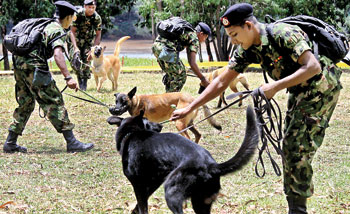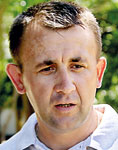Max is the self-appointed leader while Jackie takes it cool. Max is bossy, stubborn and goes about his job quickly and efficiently. Jackie averse to harsh orders is meticulous, a perfect contrast to Max.
Max, a German Shepherd, and Jackie, a Belgian Malinois, are among a pack of six de-mining dogs undergoing rigorous training at the Sri Lanka School of Military Engineering at Embilipitiya.
Training with their dogs every day on a schedule that kicks off at 5 a.m., the bond between handler and dog is strong, with human and canine companions complementing each other well.
 |
| Building bonds between man and canine. Pix by M.A. Pushpa Kumara |
Max is enthusiastic and hardworking, says Corporal Aruna Shantha, while Lance Corporal Nishantha Kumara describes Jackie as slow, yet efficient. “She’s very loving,” says Corporal Kumara, satisfied with the progress they have made and enjoying his new responsibility. Dog and soldier-handler spend a greater part of the day together, forming close attachments.
Both dogs and handlers are selected through a careful process.
K-9 teams or Mine Detection Dogs (MDDs) are trained by the Global Training Academy (GTA) of the Marshall Legacy Institute in Texas, America, and sent to landmine-affected countries to assist with the de-mining process.
The process of selecting and training the dogs is a time-consuming and elaborate one and GTA’s Senior Dog Instructor Adis Pelto is now in Sri Lanka to facilitate this. Mr. Pelto from Bosnia who has been training dogs for 15 years, is here to help train the six-pack to be obedient and seek out mines adeptly as well as adapt to the humid and stifling climate of their new home.
Describing the process of selecting the dogs, Mr. Pelto says they have a breeder in Amsterdam from whom they get 500 to 600 puppies, from among whom 100 are selected for basic training in Texas. It is in Texas that they are later channelled to the “field” they are best suited, such as Drug Detector Dogs, Arson Dogs and Police K9’s.
“Only the top of the crop, about 5%, qualify as MDDs,” he says, explaining that the selected MDDs are introduced to the country affected by landmines for familiarization and extensive training when they are about two years old. They need to be trained to locate mines that are distinct to that country and they need to adapt to the climate and the food.
Dogs are better than metal detectors because they can sniff out plastic landmines too, according to Mr. Pelto. The dog is trained to detect the vapour of TNT (Trinitrotoluene) from the mine that tends to travel upwards. In hotter and more humid climates, the TNT in explosives rises faster, and depending on how deep in the ground the landmine has been placed and how long, anything from when the war started 25 years back to when it ended two years ago can be detected by the dogs.
 |
| Adis Pelto |
Generally it can take about five to six months for the vapour to reach the surface if the mine is placed five cm deep, he explains.
However, Mr. Pelto says that training the dogs to sniff out the vapour is the easy part. The trying part of the training is getting the dogs to search in a straight line of about two metres wide right up to the end of their ‘long leash’ and return to their handler. If they detect the scent of TNT, they pin-point the area in which the landmine is located with their nose and freeze waiting for the handler’s next command. They are immediately rewarded with a ‘kong’ (a toy).
He stresses that they don’t treat the dogs as tools. “They are not machines. They don’t have an on and off button. If they work for 20 minutes then they rest for 20 minutes. They must have equal time of rest for the work they do.” The handler should be able to read his dog and be familiar with its every behavioural nuance, he says, adding that the training is highly successful.
Only two dogs of the hundreds his organisation has trained over the years have died on the job, according to Mr. Pelto.
To ensure the safety and care of the dog, handlers are screened and evaluated on their personalities before they are given an MDD. “The personality of the dog must match the personality of its trainer. Max needs a handler who can control him. If he thinks his handler is weak he won’t take orders from him, Max is the alpha male after all. But Jackie’s handler must have a gentler personality,” he says, adding that Jackie needs to be talked to and petted excessively.
This six-pack of MDDs is the second in Sri Lanka. Back in 2006 another team of six was here. Now they are retired. As they grow older and their senses weaken, MDDs are retired after six to eight years and given to loving homes. The initial team is now in Vavuniya, away from the minefields.
Max, Jackie and their pack will soon be ready for their final test designed by the UN. Once they pass it, they will be deployed to landmine-affected areas. These brave canine-human teams, who undertake this humanitarian operation, play a key role in the safety of post-war Sri Lanka.
Working towards a world free of landmines
We want people to go to work and children to play without the fear of landmines, says the President and Executive Director of The Marshall Legacy Institute (MLI), Perry F. Baltimore, stressing that landmines are a “big obstacle” to hope, growth and stability.
MLI, a US-based non-profit organization, not only donates Mine Detection Dogs (MDDs) to affected countries but also provides medical treatment and prostheses, rehabilitative care, vocational training and assistance to landmine survivors. It is working towards the creation of a world free of landmines that otherwise threaten the lives and livelihoods of people in post-conflict zones.
With donations from the American government and private donors, MLI has given more than 100 MDDs to 12 countries affected by post-conflict mines and unexploded ordnance including Vietnam, Afghanistan, Iraq, Bosnia and Lebanon.
MLI also has a unique programme -- Children Against Mines Programme (CHAMPS) under which schoolchildren from across the United States are educated about the threat of landmines in other countries and encouraged to raise funds and sponsor their own MDD. Over the years, CHAMPS has raised over $400,000 and sponsored more than 20 MDDs.
 |
| Perry Baltimore |
The six-pack of MDDs donated to Sri Lanka undergoing training at Embilipitiya comprise ‘L'il Swoop’(Max) sponsored by Wister Elementary School and the professional football team Philadelphia Eagles; ‘Spartacus’ sponsored by the schoolchildren of Katy, Texas; ‘Yankee’ sponsored by the schoolchildren of Greenwich, Connecticut; and ‘Jackie’, ‘Ronnie’ and ‘Taso’ sponsored by the US Department of Defence.
In Sri Lanka recently to see how the MDDs were doing in their new home was Mr. Baltimore, accompanied by Paul Irwin, MLI Board Member and former President of the Humane Society of the United States, and spouse Jean; Billie Furay, CHAMPS student leader from The Woodlands, Texas, and his stepfather Steve Creswell who is a Texas businessman; Rebecca Long, Sixth-grade teacher at Wister Elementary School; Nicholas Powles, CHAMPS student leader from Wister Elementary School; Jessica Postlethwaite, teacher from Katy; and MLI Vice Presidents Kimberly McCasland (Children’s Program) and Elise Becker (Operations).
Explaining their invaluable contributions, Mr. Baltimore says Billie led his school and community in a fundraising campaign to sponsor ‘Texas’ now serving in Iraq,
Rebecca helped coordinate a fundraising campaign between her inner-city school and the Philadelphia Eagles and Nicholas was heavily involved with the fundraising to sponsor ‘L'il Swoop’(Max) for Sri Lanka.
“Rebecca's students have also participated in video conference calls with a school in Basra, Iraq through MLI's CHAMPS program. The Philadelphia Eagles and Wister Elementary contributed an additional $8,000, which was used to help young Mohammad Itewi, an Iraqi landmine survivor who required two prosthetic arms, one leg and eye surgery following a landmine incident in Basra,” he says.
Through video conferencing, students in the US are given an opportunity to interact with children from affected countries, who are taught to carry the message of landmine awareness to their communities and find survivors who need help. Once such survivors are located, the partner schools in the US will raise funds to provide them with medical care and support, says Mr. Baltimore, explaining that MLI hopes to link American schools with schools in landmine- contaminated areas in Sri Lanka to assist children who have been injured by landmines.
While they were in Sri Lanka, MLI’s donors met their sponsored dogs at Mattegoda in a “wonderful opportunity” to see how they were doing and presented personalized collars for the dogs. They took many photos with the dogs and their handlers to take back home, he added.
|




